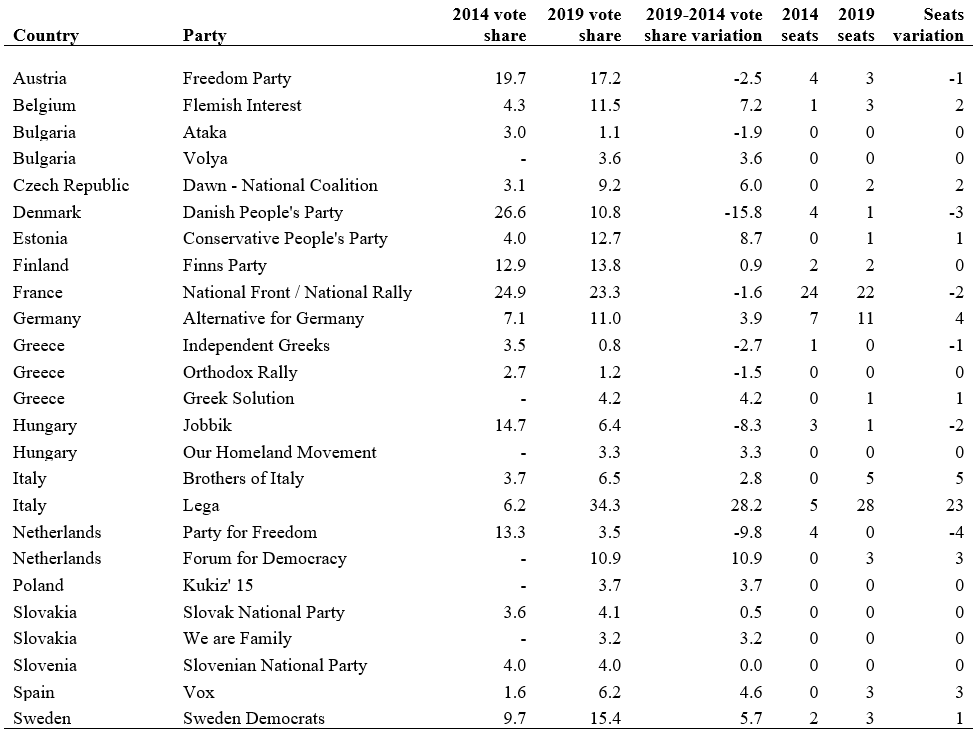 Martin Selmayr, the Secretary-General of the European Commission, has stated that the ‘populist wave’ some analysts predicted could appear in the 2019 European Parliament elections was ‘contained’. Mattia Zulianello argues that this greatly overlooks a substantial increase in the influence of right-wing populism over European politics.
Martin Selmayr, the Secretary-General of the European Commission, has stated that the ‘populist wave’ some analysts predicted could appear in the 2019 European Parliament elections was ‘contained’. Mattia Zulianello argues that this greatly overlooks a substantial increase in the influence of right-wing populism over European politics.
In the period preceding the European elections, many journalists and analysts were anticipating that 2019 could be remembered as an annus horribilis for the EU following another ‘populist wave’. However, once the polling stations had closed and ballots began to be counted, the same journalists and analysts trumpeted the ‘halt’ of populists, with Martin Selmayr (the Secretary-General of the European Commission) declaring that the so-called populist wave had been ‘contained’. While this claim holds some truth in the case of left-wing (e.g. Podemos and Syriza) and more eclectic populist actors (e.g. the Five Star Movement in Italy), it underestimates the (growing) relevance of right-wing populism and especially that of the populist radical right.
Table 1: Electoral performance of populist radical right parties in the 2014 and 2019 European Parliament elections
Note: Figures compiled by the author.
In terms of vote share, the average performance of populist radical right parties in 2019 was 8.9% (Table 1), while that of other right-wing populists was 19.2% (Table 2). However, the latter average is largely dependent on a few specific cases, such as Fidesz in Hungary (52.3%), Law and Justice in Poland (45.4%), and the Brexit Party in the UK (30.8%). That said, the aggregate average electoral gains of the populist radical right and other right wing populists in comparison with 2014 are modest and very similar (+2.1% and +1.7%, respectively), although a considerable variation across the countries and parties emerges.
Table 2: Electoral performance of other right-wing populist parties in the 2014 and 2019 European Parliament elections
Note: Figures compiled by the author.
The populist radical right made spectacular gains in Italy, where a major realignment within right-wing populists has occurred with the fall of Forza Italia (-8%) and the impressive gains of the populist radical right Lega and Brothers of Italy (a combined +31%). Noticeable breakthroughs of the populist radical right also occurred in Belgium (Flemish Interest, +7.2%), Estonia (Conservative People’s Party, +8.7%), Sweden (Sweden Democrats, +5.7%), Spain (Vox, +4.6%), and Germany (Alternative for Germany, +3.9%).
In the other cases, the electoral gains of the populist radical right were minimal (e.g. Finland, +0.9) or non-existent (e.g. Greece), and in four cases a negative trend was recorded (Austria, – 2.5%; Hungary, -5%; France, -1.6%, and especially Denmark, -15.8%). The other right-wing populists performed well in Poland (Law and Justice, +13.6%) the UK (the Brexit Party, which almost erased the electoral support of UKIP), and Luxembourg (Alternative Democratic Reform, +2.5%), while in Hungary gains were minimal (Fidesz, +0.9%). However, in the majority of the other cases a negative pattern was clearly visible (Belgium, Bulgaria, and especially Italy).
It is interesting to note the electoral fortunes of top-performing newcomers (i.e. parties that did not contest the 2014 election), such as the Brexit Party in the UK (30.8%), the Dutch Forum for Democracy (10.9%), and the Greek Solution (4.2%), largely occurred at the expense of other right-wing populist competitors, respectively UKIP (-23.6%), the Party for Freedom (-9.8%), and the Independent Greeks (-2.7%) and Orthodox Rally (-1.5%). At the same time, 10 out of 19 populist radical right parties that also contested the 2014 elections increased their vote share in 2019, while in the case of the other right-wing populists only three out of seven did so.
Overall, the so-called ‘containment’ of the populist wave appears more appropriate for the declining fortunes of left-wing populist parties, as well as of other parties that are neither left nor right, such as the Five Star Movement in Italy. Moreover, the modest gains by right-wing populists should not be interpreted as a modest increase in terms of influence. Quite the contrary. Although the right-wing populists are themselves a broad church and they belong to different EP groupings – e.g. Fidesz is still in the European People’s Party (EPP), while Law and Justice are part of the European Conservatives and Reformists (ECR) – the 2019-2024 legislature will see unprecedented political power for populist radical right parties.
Indeed, while the net gain in terms of seats of the other right-wing populists was limited (+6), the populist radical right substantially increased its representation in the European Parliament (+32) – although a large majority of these seats are held by specific parties (notably the Lega in Italy, +23 seats). Hence, the new European Alliance of Peoples and Nations group (in which many contemporary populist radical right parties will be represented) will clearly have greater influence in comparison to its predecessor, the Europe of Nations and Freedom group. This is also thanks to the fact it will be joined by parties that were previously part of other groups (e.g. the Danish People’s Party and the Finns Party), and especially now the two traditional major groups in the parliament, the European People’s Party and Socialists and Democrats, no longer have a majority.
In conclusion, the modest electoral gains of right-wing populists in the 2019 elections should not be confused with a containment of the relevance of such parties. On the contrary, it is important to recall that right-wing populism performed rather well in the 2014 elections, and that the consolidation of their support across Europe in 2019 suggests centre-right and centre-left parties have limited capacity to develop successful strategies for targeting the electoral base of their populist competitors.
Even when the mainstream moderate parties of the centre-right and centre-left managed to gain votes at the expense of right-wing populists (most notably in Denmark), the former followed a strategy of parroting the policies and narrative frames of the populist radical right, most notably over immigration and asylum. Paradoxically, this has translated into the increasing relevance, influence and legitimation of right-wing populism in European politics.
Please read our comments policy before commenting.
Note: This article gives the views of the author, not the position of EUROPP – European Politics and Policy or the London School of Economics. Featured image credit: Confartigianato Imprese (CC BY-NC-SA 2.0)
_________________________________
 Mattia Zulianello – University of Florence
Mattia Zulianello – University of Florence
Mattia Zulianello is a Postdoctoral Fellow in the Department of Political and Social Science at the University of Florence.




